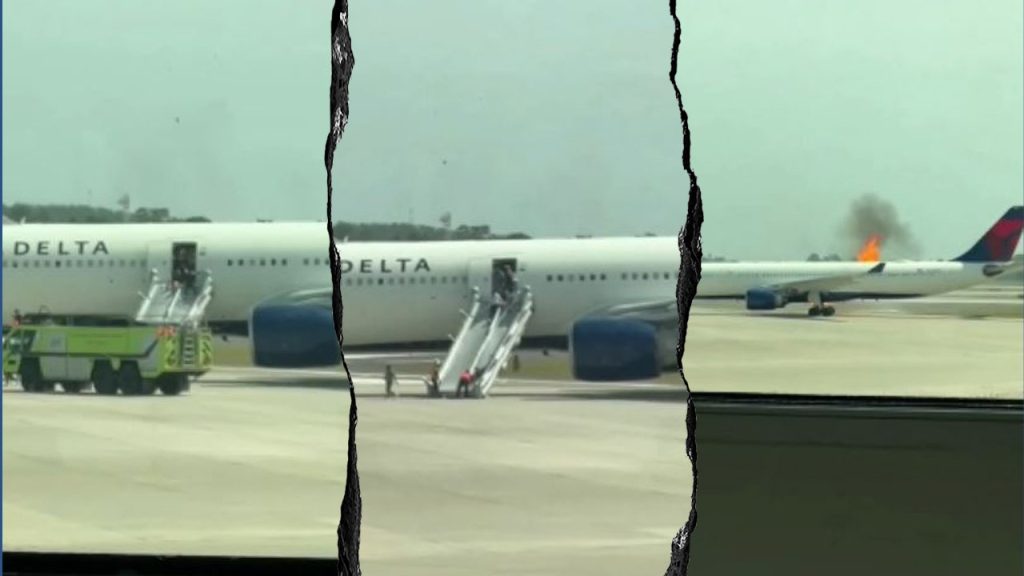On Monday, a Delta Air Lines flight was evacuated at Orlando International Airport after flames were detected emanating from one of its engines shortly before takeoff. Delta Flight 1213, bound for Atlanta, had to use emergency slides for an evacuation as passengers filmed the chaotic scene unfolding on the tarmac. Fortunately, there were no initial reports of injuries, and the airline has since addressed the situation by providing alternatives to affected passengers.
| Article Subheadings |
|---|
| 1) Dramatic Engine Fire Forces Evacuation |
| 2) Response from Delta Air Lines |
| 3) Passenger Accounts of the Incident |
| 4) Investigation and Safety Measures |
| 5) Airline Industry Implications |
Dramatic Engine Fire Forces Evacuation
On the morning of the incident, Delta Flight 1213 was preparing for a scheduled departure from Orlando International Airport when crew members noticed flames in the tailpipe of one of the engine units shortly before takeoff. The Airbus A330 was fully loaded with approximately 200 passengers, alongside 10 flight attendants and two pilots, ready for what should have been a typical domestic travel experience. The sight of flames triggered immediate action; the flight crew activated emergency protocols to secure the safety of everyone onboard.
According to eyewitness accounts and videos shared on social media, passengers were seen evacuating via the emergency slides as flames became visible on the aircraft. The incident unfolded on the tarmac, which provided first responders with swift access to the situation, ensuring that all those onboard could leave the aircraft promptly. The urgency of the situation was palpable, as airport personnel assisted passengers in evacuating to safety.
Response from Delta Air Lines
Delta Air Lines issued a statement confirming the occurrence and articulating their commitment to passenger safety. The airline spokesperson remarked, “Nothing is more important than safety, and Delta teams will work to get our customers to their final destinations as soon as possible.” Following the evacuation, passengers were escorted back into the terminal where they received beverages and food while waiting for updated travel arrangements.
In this case, Delta’s response included not just the immediate evacuation but also an empathetic approach to supporting passengers post-incident. Individuals who were scheduled to fly to Atlanta were later rebooked onto another aircraft as quickly as feasible, minimizing disruptions caused by the technical failure. Delta has stressed that its teams are trained to handle emergencies efficiently, showcasing their operational protocols under pressure.
Passenger Accounts of the Incident
Passengers onboard reported a mix of panic and confusion during the event. Some claimed they initially did not understand the seriousness of the situation when instructed to evacuate, as they expected a routine flight. The urgency with which the flight crew acted likely mitigated potential injuries.
One passenger, who wished to remain anonymous, remarked, “
We heard some commotion, and then the crew started yelling for us to get out. It was surreal. One moment you’re getting settled, and the next, there’s a fire.
” This perspective highlights the emotional transition experienced by passengers suddenly finding themselves in a life-threatening situation.
As accounts continued to surface, many passengers expressed gratitude for the preparedness and professionalism exhibited by the flight crew. Their rapid response undoubtedly played a crucial role in ensuring the safety of all passengers onboard, and their actions are likely to be commended in the aftermath.
Investigation and Safety Measures
In the aftermath of the incident, both Delta and the Federal Aviation Administration (FAA) announced investigations into the cause of the engine fire. While no injuries were reported immediately following the evacuation, both agencies are prioritizing thorough investigations to prevent future occurrences. Delta has pledged full cooperation with the FAA to uncover the underlying causes of the engine malfunction.
In addition to assessing the mechanical aspects, investigators will also look into whether maintenance routines and inspections were performed in compliance with aviation safety standards. Lessons from the incident could prompt heightened scrutiny of safety protocols, thus enhancing technical reliability across the fleet of similar aircraft.
Airline Industry Implications
Events of this nature can have far-reaching consequences for airlines, especially concerning passenger confidence. It raises critical questions about safety procedures and technical reliability of aircraft. As the airline industry navigates through post-pandemic recoveries, incidents such as these can exacerbate pre-existing anxieties regarding air travel safety.
Analysts suggest that, while such emergency situations are relatively rare, they pose challenges that could reshape consumer perceptions and influence decisions on travel. The FAA’s findings including penalties, if applicable, could influence regulations as well as operational mandates across the industry, ultimately impacting how airlines approach aircraft maintenance and training for crew members.
